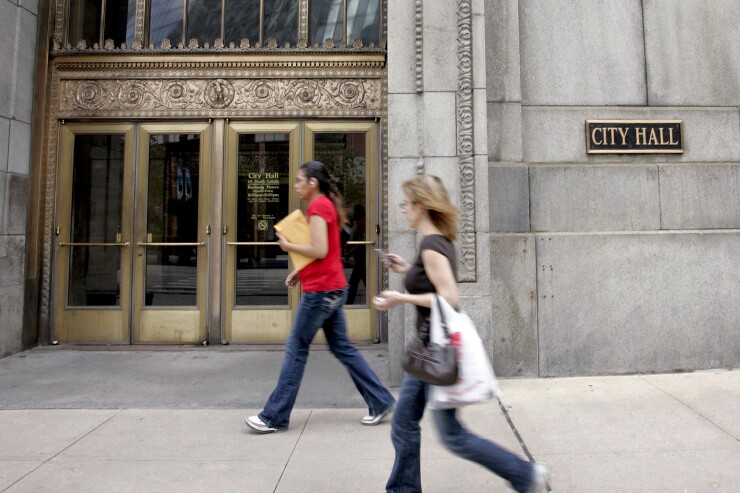S&P revises Chicago’s outlook to negative
6 min read

Bloomberg News
S&P Global Ratings revised Chicago’s outlook to negative from stable on Thursday and affirmed its BBB rating on the city’s outstanding general obligation debt.
The rating agency cited the city’s persistent budgetary structural imbalance, its weakened reserves after years of deficit spending and Mayor Brandon Johnson’s decision to cut back supplemental pension contributions in
S&P also raised concerns around political gridlock and social capital risks, like inequities in health care, public education and housing, that could drive population loss.
“The negative outlook reflects our view that there is at least a one-in-three chance of a lower rating within our two-year outlook horizon,” S&P said in its rating report, noting, it is evaluating Chicago’s GO credit performance in light of several factors.
Those factors include the final 2026 budget and the city’s performance during the year relative to the budget; city leadership’s ability to deliver structural solutions, including by drawing on recent
“I don’t think this is going to have a big impact on how the city trades,” said Howard Cure, partner and director of municipal bond research at Evercore Wealth Management. “I don’t think these are revelatory statements. … The (final) budget and the negotiations around it are what’s going to set the trajectory for the city.”
It didn’t help that the state recently
“Any reluctance to fully fund the pensions and make some headway toward lowering the liabilities is going to be a real negative,” he said. “They need to make progress on that because that’s their big knock. You never hear about the economy (being a problem).”
This was “100% expected,” said Justin Marlowe, research professor at the University of Chicago’s Harris School of Public Policy and director of the Center for Municipal Finance.
Marlowe acknowledged the mayor’s proposed budget includes new recurring revenue streams, but said the political reality is that those will be very difficult to implement.
“To get this budget done on the timeframe that they have available, they will likely need to work with the revenue sources they have,” he said. “The rating agencies are saying based on the revenues you have and based on your spending needs, this is not structurally sound.”
Marlowe also pointed
That’s been a “persistent trend,” he said. According to Center for Municipal Finance data, the index of all big cities was up 16% year-over-year as of Thursday. As of Monday, Chicago was up only 4% for the year.
“In a less forgiving market environment, Chicago might very well be losing ground,” Marlowe said. “They’re being propped up a little bit by a healthy market.
“Regardless of what happens with spreads, the broader investor sentiment is flat and could turn much more negative at any moment,” he added. “The rating agencies are saying that the way that the budget debate is shaping up is even more evidence of the central problem with Chicago’s finances, which is a governance problem.”
On the governance front, S&P is calling out the issues that rating agencies have been highlighting for the last year to year and a half, said Civic Federation President Joe Ferguson. They’re warning of a shift “from capacity to make debt service obligations to a recognition of the long-term structural issues” facing the city, Ferguson said.
“Both the substance and the timing of the S&P action really should be viewed as a final warning,” he said. “The red lights are flashing and there truly is no more runway here. The city needs to get serious as a fiscally responsible budgeting entity.”
The most important next steps are for Ernst & Young consultants to testify before the City Council about why the efficiencies detailed in their report were mostly not incorporated into the mayor’s proposed budget, Ferguson said. The report identified as much as $1.4 billion in efficiencies; the mayor’s budget included about $12 million in structural efficiencies.
And that must be followed by testimony from the mayor’s budget director, CFO and comptroller, he said — a step that was delayed last month amid a dispute between some alderpeople and the mayor’s team over the Ernst & Young testimony.
Nearly a dozen alderpeople called for a special meeting of the City Council next week after the Johnson administration delayed them from hearing directly from Ernst & Young, according to a letter shared with The Bond Buyer. The alderpeople asked the authors of the Ernst & Young report to address the City Council on Nov. 10.
The hearing called by the City Council is a significant step forward and shows it recognizes the need to be a coequal player, Ferguson said. But he also flagged the city’s lack of a municipal constitution that balances power and provides necessary structure, saying it is “fundamental to how we got into this situation and how we need to get out of it.”
He added, “The transactional, at-the-margins approach to budgets and policy decisions is occurring without a broader vision for core infrastructure that is needed both to sustain and to grow the city.”
For example, the risk of random jumps in property taxes is “probably at this juncture the single biggest disincentive to build in Chicago,” he said. “The city needs to demonstrate itself to be fiscally responsible in its budgeting in order to demonstrate to capital markets and developers that it is safe to build in Chicago.”
Municipal Market Analytics Chief Credit Officer and Managing Director Lisa Washburn said in an emailed statement the mayor’s decision to scale back the supplemental pension payments “dilutes the mechanism that (the city) had put in place to keep the unfunded pension liability from growing.”
Washburn noted the city plans a sale on the sales tax securitization credit for near-term budgetary savings, which underlines Chicago’s continued reliance on non-recurring solutions to address its structural budget gap. She predicted future budgets will get even harder to balance, driving further downward ratings momentum.
Chicago faces a downgrade if it fails to make structural budget fixes that put it on a more sustainable path, or if it fails to minimize its growth in net pension liabilities, the rating agency said.
Conversely, S&P said it could revise the outlook back to stable if Chicago identifies and implements recurring revenue solutions or expenditure cuts and if it stabilizes pension funding levels by moving closer to the levels recommended under its supplemental pension funding policy.
Cure said he’ll be watching where S&P stops — will the rating agency downgrade the city to BBB-minus or push it below investment grade?
“The final budget is going to be very heavily scrutinized as to how they’re balancing it,” Cure said. “How assertive are the alders going to be about incorporating these (consulting firm and task force) recommendations? Or are they going to rely on the mayor? This is the test, as far as how the mayor negotiates and gets cooperation and effectively structurally balances the budget.”
The city’s finance team did not respond to a request for comment by press time.







